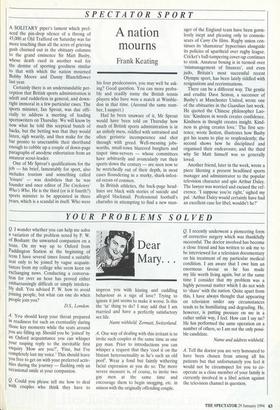YOUR PROBLEMS SOLVED
Q. I wonder whether you can help me solve a variation of the problem noted by P. W. of Bosham: the unwanted companion on a train. On my way up to Oxford from Paddington Station at the beginning of term I have several times found a suitable seat only to be joined by vague acquain- tances from my college who seem keen on exchanging news. Conducting a conversa- tion for over an hour has proved either embarrassingly difficult or simply intolera- bly dull. You advised P. W. how to avoid Joining people, but what can one do when People join you?
D.S., London.
2. You should keep your throat prepared in readiness for such an eventuality during those key moments while the seats around you are filling up. Should you be 'joined' by an Oxford acquaintance you can whisper your rasping reply to the inevitable first enquiry 'How are you?', 'Fine, but I've Completely lost my voice.' This should leave you free to get on with your preferred activ- ities during the journey — flashing only an occasional smile at your companion.
Q: Could you please tell me how to deal with couples who think they have to
Dear Mary. . .
impress you with kissing and cuddling behaviour as a sign of love? Trying to ignore it just seems to make it worse. Is this the in' thing to do? I may add that I am married and have a perfectly satisfactory sex life.
Name withheld. Zermatt, Switzerland.
A. One way of dealing with this irritant is to invite such couples at the same time as one gay man. Prior to introductions you can whisper a request that they 'cool it on the blatant heterosexuality as he's such an old poor. Wear a fond but faintly withering facial expression as you do so. The more severe measure is, of course, to invite two gay men at the same time and encourage them to begin snogging, etc. in unison with the originally offending couple. Q. I recently underwent a pioneering form of corrective surgery which was thankfully successful. The doctor involved has become a close friend and has written to ask me to be interviewed for a television documentary on his treatment of my particular medical condition. I am aware that I owe him an enormous favour as he has made my life worth living again, but at the same time I consider that my problem was a highly personal matter which I do not wish to 'share' with the nation. Quite apart from this, I have always thought that appearing on television under any circumstances tends to be humiliating and degrading. He, however, is putting pressure on me in a rather unfair way, I feel. How can I say no? He has performed the same operation on a number of others, so I am not the only possi- ble candidate.
Name and address withheld.
A. Tell the doctor you are very honoured to have been chosen from among all his patients but that unfortunately you feel it would not be circumspect for you to co- operate as a close member of your family is currently involved in a libel action against the television channel in question.


































































 Previous page
Previous page